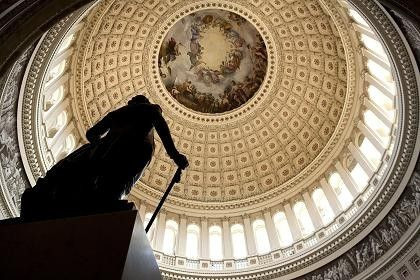U.S. Budget Deficit to Shrink to $1.1 Trillion in 2012, but Growth to Remain 'Sluggish': CBO

The federal budget deficit will dip to the still substantial sum of $1.1 trillion in 2012 as the economy continues to grow slowly, according to a projection by the Congressional Budget Office (CBO).
The analysis found that the deficit will likely account for about 7 percent of U.S. Gross Domestic Product (GDP) in 2012, a decline of about 2 percentage points from 2011 but higher than at any time between 1947 and 2008. GDP growth is expected to be modest, with the world's largest economy expanding only 2 percent in 2012.
CBO Sees U.S. Output Gap Continuing Until 2018
The report offered grim estimates for the pace of economic recovery, projecting that the economic output would be below its potential until 2018 and that the unemployment rate will remain above 7 percent until 2015.
Considerable slack remains in the labor market, mainly as a consequence of continued weakness in demand for goods and services, the report's summary read.
The CBO makes its projections under the assumption that current laws will be unchanged, and the report noted that a combination of tax cuts scheduled to expire and spending cuts enacted by the congressional super committee would check the deficit's growth. Revenues would surge by 30 percent under 2012 and 2014 if the Bush-era tax cuts sunset in December, with the spending caps mandated by the super committee would temporarily offset the effects of an aging population and soaring health care costs.
Deficit Will be Larger if Bush Tax Cuts Are Extended
If lawmakers change the picture by extending some of the Bush-era's tax cuts, blocking the super committee cuts and preventing Medicare payments from dropping by 27 percent in March 2012, the yearly deficit would be much higher. The $2.1 trillion in automatic budget cuts over the next 10 years triggered by the super committee's failure to strike a deal would be far outweighed by the cost of keeping the Bush tax cuts in place, which would amount to a combined $11 trillion in deficits between 2013 and 2022.
How much and how quickly the deficit declines will depend in part on how well the economy does over the next few years, the authors wrote. Probably more critical, though, will be the fiscal policy choices made by lawmakers as they face the substantial changes to tax and spending policies that are slated to take effect within the next year under current law.
--
© Copyright IBTimes 2024. All rights reserved.





















